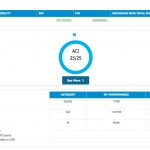“One of the measures is improved access to care, or 24/7 access to clinicians for urgent or emerging care. That could be expanded hours, phone visits or same-day appointments. This is something we talk about doing all the time in rheumatology. Documenting these activities will be useful for you,” he said. Telehealth also earns MIPS points, but many rheumatologists are still unsure how to incorporate this technology into clinical care, he said.
Use the ACR’s RISE Registry
Using a qualified clinical data registry (QCDR) such as the ACR’s Rheumatology Informatics System for Effectiveness (RISE) Registry, earns points in MIPS. RISE is free for ACR and ARHP members. It passively extracts data from a practice’s electronic health record (EHR) and reports it directly to the CMS, said Dr. Limanni.
RISE helps users score points for another MIPS measure: assessing local practice patterns and improving care for vulnerable populations. “Use your registry functions and your EHR to look for local patients with specific diseases or in specific demographics, and then come up with an action plan to deal with them,” he said. Beneficiary engagement also earns points and can be done with RISE.
The ACR offers free technology support to help rheumatologists connect to RISE, said Dr. Yazdany. These consultants can tailor the registry to suit each practice’s workflow or EHR system. Practices that use an EHR with cloud-based data storage or those in large networks with IT security firewalls have had issues connecting to RISE, but the ACR is committed to lowering those barriers to more rheumatologists using the registry, said Dr. Yazdany.
Episodes of Care
Cost-Focused Quality Resource and Utilization Reporting, or QRUR, will begin to affect MIPS scores in the second reporting year. These reports will compare providers’ costs and treatment quality according to national benchmarks. They will track episodes of care or all clinical services for specific diagnoses triggered by the entry of an ICD-10 code, said Dr. Limanni. The ACR is working with the CMS to create rheumatology-specific episodes of care definitions, especially for RA and lupus.
“We don’t know what the duration of the episode is in rheumatology. As a rheumatologist, I think, rheumatoid arthritis is forever. Are they going to track my patient forever and all the costs associated with my patient forever? That’s yet to be decided,” said Dr. Limanni.
MIPS: Impact on Payments
MACRA is budget neutral and competitive by design, said Dr. Yazdany. Each year, a quality score threshold will determine whether providers receive negative or positive reimbursement.


